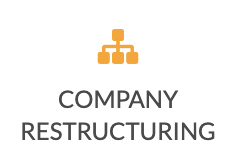Share Buyback and Share Redemption
A share buyback or redeem of shares is often the most logical step for companies faced with having a shareholder who would like to relinquish their shareholding but may not want to sell their shares on the open market. Examples of where this might happen include:
- A shareholder retiring and wanting to access cash that has been accumulated in the company
- One or more of the shareholders being bought out by the company to resolve a disagreement
- Personal representatives of a deceased shareholder not wishing to retain shares they have been bequeathed
In theory, share buyback or share redemption may seem like a straightforward option, but, as with most legal and taxation matters, this is far from the case. There are many factors to consider, starting with the basic decision of whether a buy-back or redemption of shares is the most suitable course of action or in fact possible under company law or tax law.
How We Can Help

Company law is a fundamental consideration in these scenarios. A company must have distributable reserves to be a position to acquire the shares if it doesn’t, a Summary Approval Procedure (SAP) may be suitable to create the reserves or possibly depending on the circumstances it could be financed from the fresh issue of shares. The shares can be bought back by they way of an off-market purchase contract or by converting the shares to redeemable shares. For a redemption to be effected, the company must also have shares that are redeemable. Various resolutions must be passed and minutes recorded for the transaction to comply with company law.

The value of the shares is another critical element. The shares must be redeemed at market value, and this often poses a problem both from a taxation and shareholder perspective. Various tax heads that are potentially in scope when a company buys back or redeems shares include capital gains tax, stamp duty (buy-back) and, potentially, income tax, depending on how the transaction is structured.
The advisor needs to be familiar with the implications of each option to ensure that the tax exposure is minimised through various reliefs available.

OmniPro can guide you through these issues, and, when a path forward has been agreed, we will advise of the tax implications, make revenue pre-approval submissions (if applicable) and draft all the necessary company secretarial documentation to allow the transaction to be effected in an efficient and compliant manner.

We can also offer your client an independent valuation of the company, if required.
Steps Involved in the Share Buyback/Redemption Process
An outline of the processes of share buy-back and share redemption is provided below. While a number of steps are noted, this step plan is not exhaustive and does not aim to capture each and every detail of the process, as there is a level of professional expertise involved in each of these transactions.
Steps Involved in the Share Buyback/Redemption Process
- Does the company have sufficient reserves – is a Summary Approval Procedure Required (SAP)/Possible or can they be bought back from a fresh issue of shares?
- If a SAP is required and applicable then execute the SAP
- Obtain a valuation for the shares
- Assess tax implications under various tax heads – will Revenue pre-approval be required?
- Date on which the transaction is to take place
Share Buyback
Assess whether the company constitution allows for shares to be bought back by the company, if not:
- Hold directors’ meetings to recommend amending the constitution and record the minutes
- Pass a special resolution to allow the shares to be bought back and to amend the constitution
- Draft an agreement for the company’s purchase of its own shares
- Hold a directors’ meeting to consider if transaction is thought fit for the company and, if so, recommend it to members
- Pass an ordinary resolution to effect the buy-back
- Arrange for the contract to be signed
- File forms (G2, B7 and H5) with the CRO
- Obtain the old share certificates and ensure that they are cancelled
- Make appropriate filings to Revenue
Redemption of Shares
Assess whether the constitution allows for the shares to be redeemed by the company, if not:
- Hold directors’ meetings to recommend amending the constitution and record the minutes
- Pass a special resolution to convert the ordinary shares to redeemable shares and to amend the constitution
- File a special resolution and the new constitution with the CRO
- Cancel old share certificates and issue new share certificates, as required
- Hold a board meeting to recommend to the members the passing of an ordinary resolution to effect the redemption of the redeemable shares
- Pass this ordinary resolution
- File forms (G2 and B7) with CRO
- Cancel share certificates as required
- Make appropriate filings to Revenue




